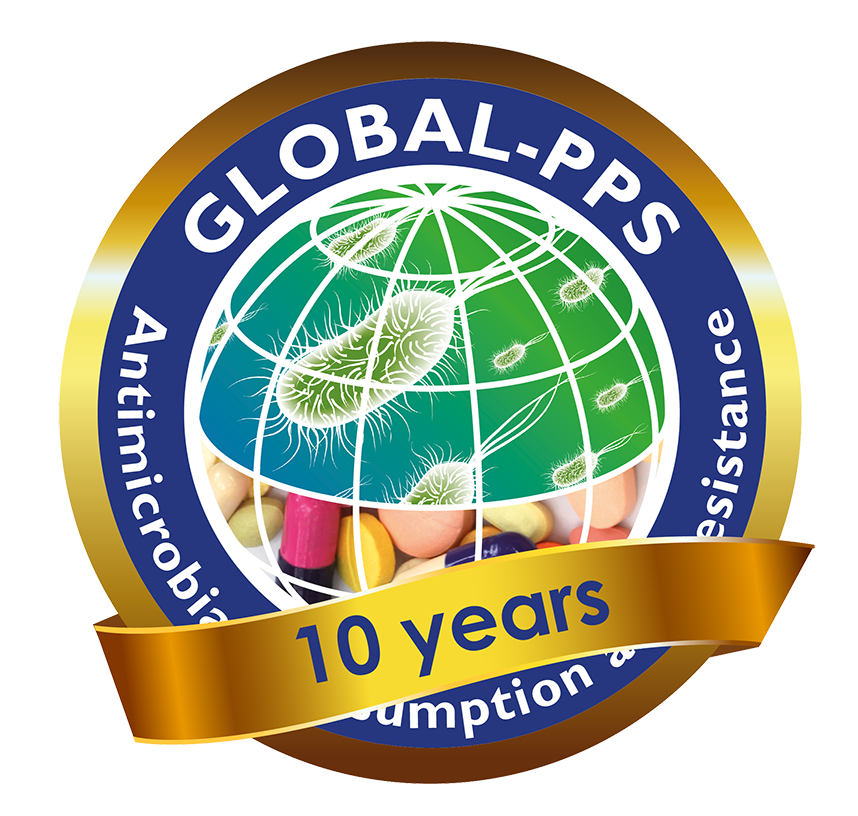Why a Global-PPS?
The Global Point Prevalence Survey of Antimicrobial Consumption and Resistance (Global-PPS) offers a simple, freely available web-based tool to measure and monitor antimicrobial prescribing and resistance in hospitals and healthcare centers worldwide. The Global-PPS has established a global network of hospitals conducting point prevalence surveys and provides quantifiable measures to assess and compare quantity and quality of antimicrobial prescribing and resistance in inpatient and outpatient adults, children and neonates worldwide. The Global-PPS creates global awareness about antibiotic use and resistance and is instrumental in planning and supporting national and local stewardship interventions in a range of resource and geographical settings.
Main aims - Critical benefits for the healthcare centers?
The Global-PPS provides a tool to:
- Evaluate antimicrobial prescribing practices and survey performance indicators in healthcare centers (identify burden),
- Help designing local interventions and identifying targets for quality improvement of antimicrobial prescribing and the prevention of Healthcare-Associated Infections (HAI) (change practice),
- Assess the effectiveness of the interventions through repeated PPSs (measure impact).
What kind of feedback is provided to you?
After finalization of data entry and validation, the healthcare center will be able to download a feedback report which can be used for local communications and presentations. Healthcare center-specific antimicrobial prevalence figures will be plotted against overall mean national and continental results. The feedback also provides information on several antibiotic quality indicators. Users can receive longitudinal feedback based on the results of their completed surveys via the interactive feature of the application.
On top of that, institutions can at any time extract their own data in an Excel file. These data can be analyzed for their own purposes.
Important
Since the introduction of the new outpatient protocoll in 2023, there are now three ways of collecting data possible:
- The original, basic PPS allows to survey antimicrobial use in inpatient settings, Healthcare-Associated Infections (HAI) and Antimicrobial Resistance.
- The full version of the PPS including an extra HAI module allows to survey invasive device use in more detail for inpatients. In addition to the basic PPS, one extra form per patient on antimicrobials needs to be completed. The extra HAI module is completely optional.
- The outpatient version of the PPS allows to survey antimicrobial use in the outpatient.
Both in- and outpatient wards can be surveyed simultaneously using the respective modules.
Ready to join us for the next Global-PPS?
Data collection
Data collection implies conducting a “one day survey”. Data are collected on paper forms, and subsequently entered in a database using the Global-PPS tool, a web-based application for data entry, validation and reporting. For outpatient departments, it is additionally possible to collect data real-time, by entering the information in the website during patient visits.
Read more about the specific data in the inpatient and outpatient modules.
Foreseen timeline
Three surveys are available each year (January-April, May-August and September-December). Hospitals can choose to participate in one to maximum three surveys a year. As such, they can follow up on interventions or investigate for example seasonal variation.
Any hospital worldwide is welcome to participate. Bigger hospitals who have participated at least once in the Global-PPS are able to participate with a subsample of the hospital whereby a set of certain ward types can be targeted (e.g. all ICUs, all surgical or all paediatric wards).
Last but not least
Data are completely anonymously entered online on the Global-PPS tool and safeguarded at the ESAC server of the University of Antwerp. The data remains the property of the hospital. bioMérieux has no access to these data, nor does the University of Antwerp disclose hospital names to any third party, including bioMérieux. Participation of hospitals and all fieldwork at the hospital level is done on a voluntary basis. The Global-PPS team encourages regional or country specific analysis led by a “local collaborating participant” or the “national or regional Global-PPS participant”.
